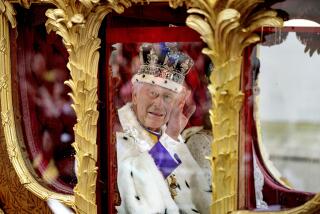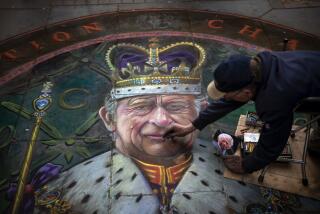Empire Fades, but Sun Will Never Set on Loyalists
- Share via
HONG KONG — On June 30, the last day of the Empire here, after the Union Jack slinks down the flagpole and the last British governor sails quietly into midnight on the royal yacht Britannia’s final voyage, Jack Edwards will fold up the flag and he too will head home--not to Britain, but to the Hong Kong flat where he has lived for 34 years.
Edwards, who first came to Hong Kong in 1945, is the keeper of the flag that British soldiers raised on Victoria Peak at the end of World War II to reclaim the territory for the king. This same banner, he hopes, will be used in the ceremony next month when Britain gives the colony back to China.
One of the territory’s older colonialists, who has shaped and been shaped by Hong Kong, won’t join the homeward-bound crowd. Edwards will, as they say in the Empire, be staying on. And for him and other crown loyalists, there will be changes, large and small, when this British colony changes hands.
“Of course I’ll feel a pang,” Edwards says about the moment that Hong Kong will be handed over. “But I’ve seen that flag torn down, stepped on and burnt, so to see it lowered in dignity won’t be so bad.”
Edwards has been the keeper not only of the flag but also of part of the Empire’s conscience: He was a prisoner of war held by the Japanese, and has made a career of shaming his government into rectifying little perfidies. And as Britain’s legacy in its last major colony is being measured and reassessed, he has done his bit to nudge concessions from London.
In 16 years of letter-writing, demonstrations and media campaigns, he helped win British pensions and passports for Hong Kong Chinese soldiers who defended the territory in World War II, POWs held here and the soldiers’ wives.
“When I found out that the government was denying those people, I thought, ‘That’s no good to Jack,’ ” he says, decked out in a safari jacket in his tiny office at the Royal British Foreign Legion. “I went to London and saw those ‘Yes, minister’ types hiding behind their desks.”
Here, he rolls his eyes and does an impression of a British bureaucrat, turning his nose up, giving a stiff-upper-lip explanation of how the government stalled the paperwork while the war widows slowly died off. By the time the women won the documents this year, he says, only 29 of the original 56 were still alive. “It took a long time, and I’m bitter about it,” he says, reverting to his own Welsh lilt, “but they finally did the right thing.”
Edwards, who celebrated his 79th birthday May 24 (Empire Day, the holiday in memory of soldiers who died defending the Commonwealth), plans to stay on with his wife. He’ll help run the legion office--one of the few institutions left with “Royal” in its title. “The Chinese haven’t said we have to change the name,” he says, though he notes that Liberation Day, marking the date Britain reclaimed Hong Kong after the war, will be renamed to reflect China’s role in the victory.
Other changes are inevitable. A military garrison that once included more than 10,000 has dwindled to a few ceremonial troops.
The daily flag-raising ceremony at the cenotaph, performed by kilted Scottish Black Watch honor guards, probably will end. The British flag there may give way to China’s red national banner and the crowns will come off the tops of the flagpoles.
But the monument, a memorial to those who died in the war, has been transformed already into a rallying point: Protesters covered it with wreaths in 1989 to honor pro-democracy demonstrators killed in and near Beijing’s Tiananmen Square. And Edwards joined them. “Those kids were dying for the same ideals that the cenotaph stands for--that is what it is all about,” he declares.
Frank Knight: ‘Time Marches On, Eh?’
Frank Knight, 67, was a crack shot as a soldier in colonial Kenya, flew (and crashed) a Tiger Moth in Malaysia when that nation was under British rule, and escaped from a Chinese prison on the other side of Hong Kong’s barbed-wire border when he served with the Royal Hong Kong Police.
More recently in his resume of anachronism, he was chapter president here of the Royal Society of St. George, a group dedicated to the celebration of all things English.
Knight is a man who keeps one step ahead of extinction as celebration of the Empire has become nearly forgotten, almost forbidden, on continents across the globe. But he’s staying on here.
“Time marches on, eh?” says Knight, a tall, bearish man. “You have to cut the cloth to fit the situation.”
It is advice well taken by Britons remaining in Hong Kong. The expatriate population has shrunk by 1,200 in the past year, and most of the 29,400 still living here will find life a bit harder. For the first time, Commonwealth citizens will have to get a work visa and prove they have skills that local workers don’t.
Even Knight, who has been in Hong Kong since 1954 and earned the respect of locals and foreigners alike with his fluent Cantonese, is feeling the difference. Since retiring from the police force in 1978, he has worked as a private investigator and security specialist, ferreting out pirated films and illicit CDs for the Motion Picture Export Assn. of America. Now he must find new work. “After 18 years, because of the change-over, they thought they should change me over for a Chinese,” he says. “It’s nonsense.”
At a final lunch at the British forces’ headquarters, which already houses a few hundred Chinese soldiers preparing to take it over July 1, Knight and old friends debated Hong Kong’s future--and its past. On the wall is a painting of a naval battle during the Opium War, the clash that led to Britain’s possession of Hong Kong Island in 1842, along with the right to continue selling opium to China. Chinese leaders call the time since “the years of humiliation.”
“Poppycock!” booms Knight. “What they say about shame and humiliation is all nonsense. If Chinese leaders wanted Britain out, they could have gotten them out at any time by cutting off the food and water coming across the border. But they’re getting back one of the greatest cities in the world. Peking [now Beijing] itself contributed very little to making Hong Kong what it is today.”
David Akers-Jones: ‘Not Much Reason to Go’
David Akers-Jones, 70, first came to Hong Kong from London in 1957 as a member of Britain’s Colonial Office on the prop plane Argonaut. The journey took three days.
If he wanted to go back to Britain today, he could have cruised on the Queen Elizabeth 2 or the Oriana ocean liners, as dozens of government employees opted to do in March. Or he could whiz back on a 13-hour plane ride, as the remaining British forces will July 1 after they see Chris Patten, the last British governor, safely off.
But Akers-Jones sees his future in Hong Kong. “We’ve been here so long,” he says, “there’s not much reason to go back. And not much to go back to.”
He has seen the Colonial Office become the Foreign and Commonwealth Office, then Her Majesty’s Overseas Civil Service and now a nearly nonexistent body that will be mostly subsumed by the Foreign Service. “We governed half the world once,” he says. Sir David, as he likes to be called, smiles. “Even America.”
As a career diplomat, he has: acted as a local mandarin, solving village disputes in Hong Kong’s rural New Territories, including cross-border talks in 1967 seeking the release of Knight from prison; witnessed former British Prime Minister Margaret Thatcher’s preparations to give Hong Kong back to China; and ultimately became disillusioned with Patten and his clashes with Beijing over democracy.
Akers-Jones--who learned Mandarin at Oxford, Cantonese in Hong Kong and has been going to the mainland since China opened its doors in 1973--considers himself a China hand. And Patten, a politician and not an Asia expert, mucked up the diplomats’ careful plans for a smooth hand-over with his demands for more democracy, asserts Akers-Jones.
After he retired from the government, Chinese officials in Hong Kong asked him in 1993 to advise them on the hand-over, a move that caused British newspapers to call him a traitor and an opportunist.
The move to advise Beijing seemed rash then, but perhaps, because he is British, it was only conspicuous. Other government officers, with varying passports, have made more subtle but significant shifts to fall in line with Beijing.
Now Akers-Jones is a director of Hong Kong and foreign companies doing business in China, finally able to exploit his expertise. He thus represents Hong Kong’s future, even though he insists: “I’m part of the memorabilia.’
More to Read
Sign up for Essential California
The most important California stories and recommendations in your inbox every morning.
You may occasionally receive promotional content from the Los Angeles Times.










